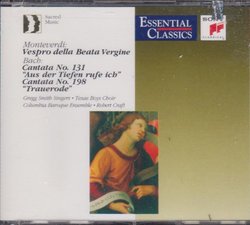| All Artists: Monteverdi, Bach, Craft, Singers Title: Vespers of the Blessed Virgin / Cantata 131 Members Wishing: 0 Total Copies: 1 Label: Sony Release Date: 9/10/1996 Genre: Classical Styles: Opera & Classical Vocal, Historical Periods, Baroque (c.1600-1750) Number of Discs: 2 SwapaCD Credits: 2 UPC: 074646265628 |
Search - Monteverdi, Bach, Craft :: Vespers of the Blessed Virgin / Cantata 131
 | Monteverdi, Bach, Craft Vespers of the Blessed Virgin / Cantata 131 Genre: Classical
![header=[] body=[This CD is available to be requested as disc only.]](/images/attributes/disc.png?v=a4e11020) ![header=[] body=[This CD is unavailable to be requested with the disc and back insert at this time.]](/images/attributes/greyed_disc_back.png?v=a4e11020) ![header=[] body=[This CD is available to be requested with the disc and front insert.]](/images/attributes/disc_front.png?v=a4e11020) ![header=[] body=[This CD is unavailable to be requested with the disc, front and back inserts at this time.]](/images/attributes/greyed_disc_front_back.png?v=a4e11020) |
Larger Image |
CD Details |
CD ReviewsMonteverdi with an Attitude Johannes Climacus | Beverly, Massachusetts | 09/08/2008 (5 out of 5 stars) "Many listeners will associate the name of Robert Craft with Twentieth Century music, notably Stravinsky. Craft assisted Stravinsky during the composer's later years in the project of recording all of his major works for the Columbia label. Since Monteverdi was reputedly one of Stravinsky's favorite composers, it is not surprising to find Craft advocating the revolutionary Venetian's music. It could be said with some justification that Monteverdi effected for his generation what Stravinsky accomplished (along with a few others) during the first decades of the Twentieth Century--namely, a radical rethinking of what counts as music.
Whatever the affinities between Stravinsky and Monteverdi, the key question is whether Robert Craft in the mid-Sixties (when this recording was made), directing an ensemble of modern instruments and non-specialist singers, could do justice to an early-Seventeenth century idiom. The answer is emphatically "yes," if in fact one is willing to listen with open ears and a certain flexibility when it comes to questions of timbre, articulation and ornamentation. Craft conjures up a thrilling spectacle in this work (or collection of works, if you prefer) by keeping textures clean, rhythmic articulation keen, and timbres lean. The Gregg Smith Singers of hallowed memory, sing this extremely tricky music with crisp diction and incisive attack, despite moments of homely intonation and some Americanized Latin. The Texas Boys Choir also makes a memorable contribution, as do the soloists. One does have to get used to the sound of modern instruments, some of which had not yet been invented during Monteverdi's time, though Craft sees to it that the ensemble avoids anything like an inflated, romanticized sound, such as that obtained by Leopold Stokowski in a privately-circulated live performance from the University of Illinois circa 1952--fascinating though that document is (listeners interested in obtaining a decently-transferred CD of that performance should Google "ReDiscovery"). This modestly-priced, and (for its day) well recorded 2-CD set also contains two Bach Cantatas (BWV 131 and 198), also directed by Craft, taken from another early stereo Columbia LP. Though tastefully played and sung, these performances are less successful than the Monteverdi; there is a certain reticence, even blandess, in Craft's approach to Bach that is all the more noticeable after the splendor of the *Vespers.* Despite these caveats, however, this is a significant historical document. If nothing else, it affords an opportunity to hear how Stravinsky--by proxy as it were--might have heard and interpreted the music of two great Baroque masters. Moreover, it adds significantly to Robert Craft's distinguished discography. Recommended not as a first version of either the Monteverdi or the Bach, but as an essential supplement for adventurous listeners, and admirers of Craft." |

 Track Listings (12) - Disc #1
Track Listings (12) - Disc #1